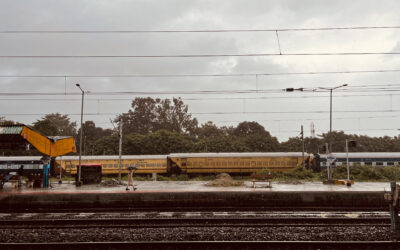When time was closing in for Durov, after a long arduous journey, on the evening of 18th day of June, he sat down and imagined the day when his fate was declared. He could not refrain himself from thinking of that evening, which was still clear in his head. The first thing Durov thought was, ‘”Why me?”, but then he had asked for it. Durov had such a hard time digesting his fate, he almost revolted. He never thought that he could complete the journey.
When I met him, I had asked, “How do you want to end this one year in Jiri?’”
To which he whimsically replied, “I don’t know if I will be able to end it”.
I was taken aback by what he said, but I couldn’t fully comprehend as to what he meant at that time. Years later, when I read the article again, to get a sense of nostalgia, I realized what he was trying to say. That day when I was taking Durov through his journey, he said, “I never imagined that a place like this existed before I came here. Dima, what I have witnessed is nothing but reflection of our society. Our constant greed for money, fame and attention is what has left these people deprived of what they deserve.”
He said that nothing can ever justify what these people have gone and are still going through. “Such form of inequality is unacceptable. How can someone let this happen?”, he remarked. Of course, he could not always answer such questions, but he would always keep pacing on the roof of the place that he had made home during his journey, while thinking about the situation.
Sometimes he used to compare those suffering here, with the ones in Plato’s Allegory of the Cave, “These people have never gone out of the cave, and thus they have never been exposed to the horrors of the society. They are far away from the cave’s entrance. The ones who walked in from outside and tried to help them, got caught with them. What does this tell you, Dima?”
“That’s an interesting conundrum Durov. I don’t have the answer to it right now”, to which he smiled and said, “Neither do I”.
He always thought that if anything could break the shackles of slavery, and hence poverty, it’s collective action. “There is no power in the world that could stand in the way of unity, Dima”. These people though deprived and suffering, know when and how to come together. That was the year Durov learned what collective action actually meant, and in the years to follow he would hold that learning extremely close to his heart. Talking to him about his year and trying to understand the community he worked with, I got really worried, not knowing how to help them.
I asked him, “Durov, aren’t you worried about the people you’re leaving behind?”. He never answered that question, and chose to stay quiet for a long time. A few years later, I found out that he was not worried because he believed that the situation would definitely improve. He was confident about it. There’s a Buddhist proverb that says, ““If you have a problem that can be fixed, then there is no use in worrying. If you have a problem that cannot be fixed, then there is no use in worrying.”
Durov was sure that the community with whom he spent his year, would one day come out of poverty and be treated as equals. That makes sense or he wouldn’t have been able to spend a year there. During the conversation, I felt an urge to ask him, “Why don’t you stay back and work here?”. He replied, “Dima, one must always know when to leave and when to let go, else one might get stuck in a vicious loop that will harm oneself and other people”. He knew that his time to go was near. He couldn’t do anything more to yield positive results for the local community.
I also remember asking him lot of personal questions that night, knowing that he would give a blank expression. Having met his parents, I knew that he was close to them, and the only child. But when it came to girls, he was a deadpan. Despite being his close friend, he would never tell me if he liked a girl or not, and would rather find a logical argument to somehow dismiss the discussion by calling it pointless. This time as well, I knew we were getting nowhere, but call it curiosity or a challenge I had taken up to make him talk, and so I asked, “I probably know your answer to this Durov. Did you meet someone special this year?”
“I met a lot of special people this year, Dima”, he replied, and I knew where this conversation was heading. I decided to not say anything, thinking to pick this fight some other day. This was 18th day of June and exactly 18 days later, Durov met the girl who had the ability to bring out rhapsodies of praise from him. I still remember that afternoon when he called while I was on my way to visit my parents in Khushma. “Dima, I found her. I have never met anyone like her before”. He was ecstatic. “That’s great Durov, what’s her name?”
“Sonia, but we met just for 3 minutes and I am not sure if I will ever see her again.”
That was it. Durov had fallen for a girl in 3 minutes, not knowing if they will meet again. It sounded unreal to hear something like this from him. He would not have any contact with Sonia for another two years as he did not have her address or phone number or social media connect, but in those two years, I heard so much about this lady from Durov as if he had known her for ages.
That night in Jiri, and those conversations with Durov are unforgettable. He had narrated stories of his adventures while climbing hills barefoot and of teaching slackline to children in villages. During his last days, he again reminded me of that 18th day of June when we sat down to talk. No doubt that the year had left a huge mark on him and had influenced to great extent what he did in the years to come.




0 Comments